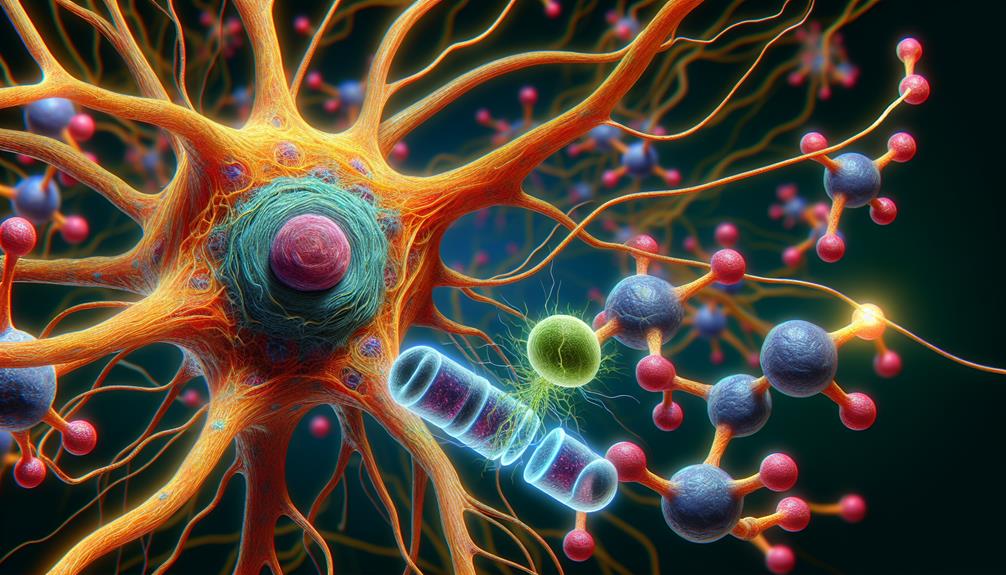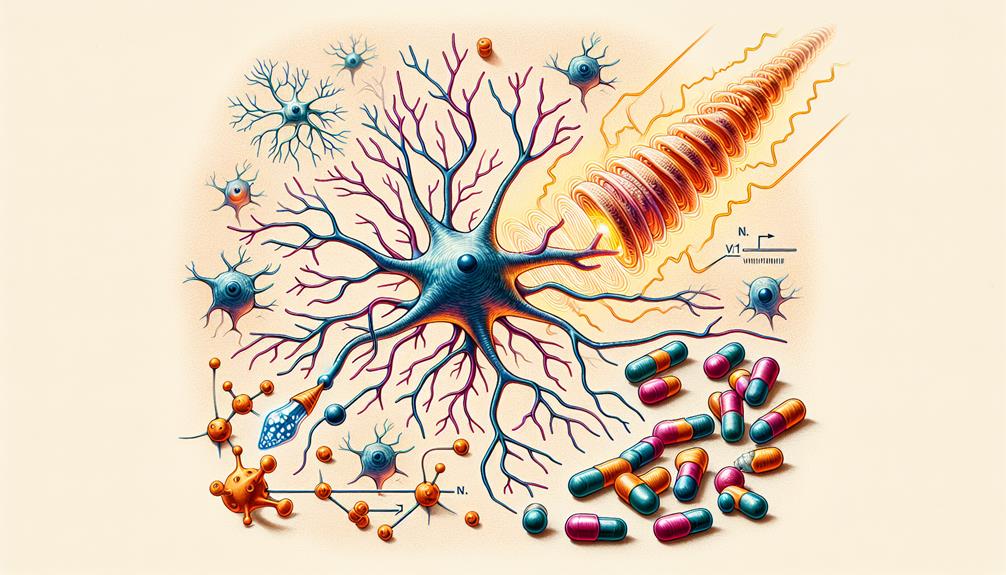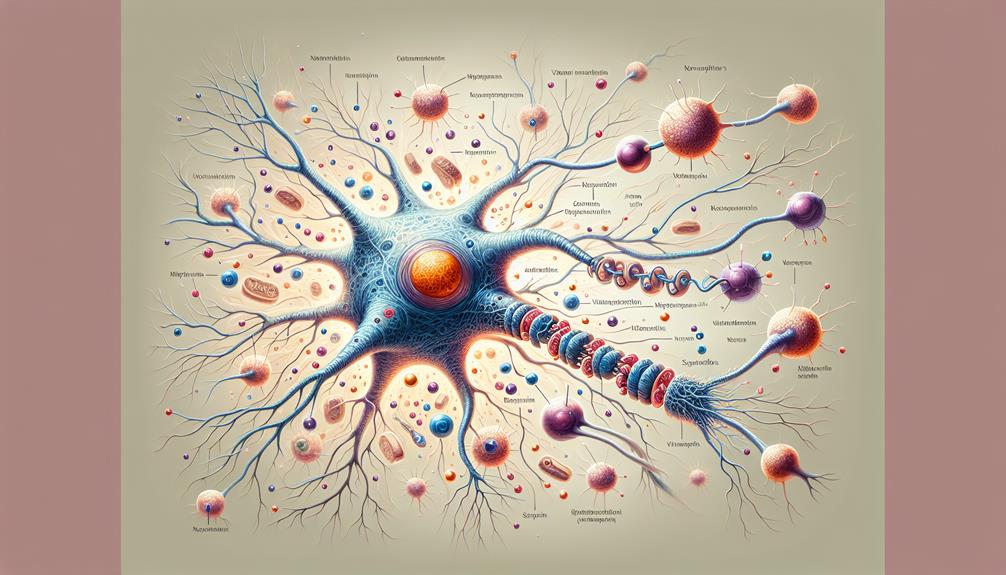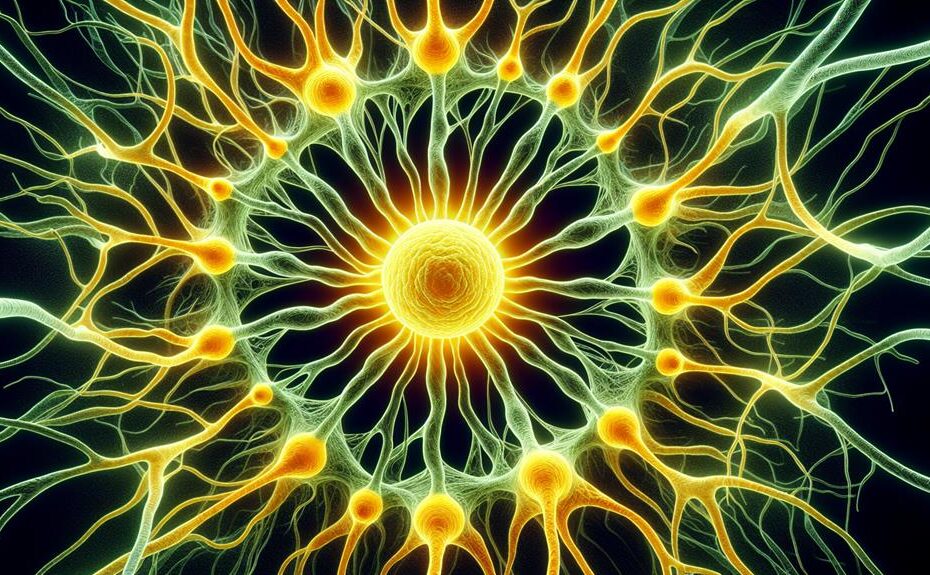







Vitamin B1 supports nerve function by aiding in energy production and neurotransmitter synthesis. It acts as a coenzyme for metabolism and promotes efficient nerve signal transmission by facilitating ATP production and maintaining ion channels in neurons. Thiamine is critical for nerve cell repair, structural integrity, and overall nerve cell health through neurotransmitter production. Stress management is key for neurological well-being, and Vitamin B1-rich foods are essential for a balanced diet. Deficiency can impact nerve function, leading to cognitive decline. Understanding how Vitamin B1 supports nerve function is fundamental for maintaining peak nerve health.
Key Takeaways
- Vitamin B1 supports nerve function by aiding in ATP production for energy.
- It plays a crucial role in neurotransmitter production essential for nerve signaling.
- Vitamin B1 promotes nerve cell repair, structural integrity, and energy conversion.
- Essential for ion channels in neurons, facilitating efficient nerve signal transmission.
- Helps protect nerves, supports brain function, and prevents cognitive impairments.
Importance of Vitamin B1
Vitamin B1, also known as thiamine, plays an essential role in supporting nerve function by facilitating the conversion of carbohydrates into energy within the body. This process is critical for energy production, as thiamine is a coenzyme that aids in the metabolism of sugars and amino acids. Without sufficient thiamine, the body struggles to generate the energy needed for various cellular activities, including those essential for nerve function.
Moreover, thiamine is important for cognitive function. It is involved in the production of neurotransmitters that are essential for proper brain function. These neurotransmitters play a significant role in communication between nerve cells, impacting various cognitive processes such as memory, concentration, and overall mental clarity. Ensuring an adequate intake of vitamin B1 is crucial for maintaining excellent cognitive function.
Nerve Signal Transmission
During nerve signal transmission, specialized cells known as neurons relay electrical impulses throughout the body to facilitate communication between various body systems. This intricate process is essential for maintaining optimal nerve health and overall body function. Neurons transmit signals by propagating action potentials along their axons, which are long projections that allow for rapid signal conduction. Vitamin B1, also known as thiamine, plays a critical role in supporting nerve signal transmission. It assists in the production of adenosine triphosphate (ATP), which is the primary energy source for cells, including neurons. Adequate levels of vitamin B1 are necessary for the proper functioning of ion channels in neurons, which are responsible for generating and transmitting electrical impulses. By supporting these essential components, vitamin B1 helps promote efficient nerve signal transmission, promoting ideal communication between the brain and the rest of the body. Maintaining sufficient levels of vitamin B1 through a balanced diet or supplementation can have significant benefits for nerve health and overall bodily functions.
Nerve Cell Health

Important nerve cell health is essential for ensuring the smooth propagation of electrical impulses throughout the body, sustaining essential communication between different body systems. Nerve cell repair is a critical process that ensures damaged cells are restored to their best functioning state. Vitamin B1 benefits nerve cell health by supporting the repair mechanisms necessary for maintaining the structural integrity of nerve cells. Additionally, Vitamin B1 plays a key role in providing neuronal support by aiding in the production of neurotransmitters essential for proper nerve cell communication. This vitamin functions by assisting in the conversion of carbohydrates into energy, which is pivotal for the metabolic processes required for nerve cell function and repair. Ensuring adequate levels of Vitamin B1 in the body is crucial for promoting optimal nerve cell health and function, ultimately contributing to the efficient transmission of nerve signals throughout the body.
Neurological Well-being
Optimizing neurological well-being requires a holistic approach that addresses various factors influencing nerve function and overall cognitive health. Stress management plays an essential role in maintaining a healthy nervous system. Chronic stress can impact neurotransmitter levels, leading to cognitive impairments and affecting nerve signaling. Adequate levels of Vitamin B1 are necessary for supporting cognitive function by aiding in the production of neurotransmitters that regulate mood and cognitive processes.
Effective stress management techniques such as mindfulness meditation, regular exercise, and adequate sleep are important for promoting ideal neurological well-being. These practices can help reduce the negative impact of stress on nerve function and cognitive health. Additionally, maintaining a balanced diet rich in Vitamin B1-containing foods can further support cognitive function and overall neurological well-being.
Role in Nervous System

What essential role does Vitamin B1 play in the nervous system's functionality? Vitamin B1, also known as thiamine, is critical for maintaining peak nerve function and brain health. One key function of Vitamin B1 in the nervous system is its role in nerve protection. Thiamine is indispensable for the production of neurotransmitters, the molecules that allow nerve cells to communicate with each other. Additionally, Vitamin B1 plays a crucial role in the metabolism of glucose, the primary source of energy for the brain. Without an adequate supply of Vitamin B1, nerve cells can become damaged, leading to impaired communication between the brain and the rest of the body.
Furthermore, Vitamin B1 is essential for supporting brain function. It is involved in the synthesis of acetylcholine, an important neurotransmitter that is vital for memory and learning. Thiamine deficiency has been linked to cognitive impairments and neurological disorders. By ensuring an adequate intake of Vitamin B1, you can help maintain the health and functionality of your nervous system and support optimal brain function.
Effects of Deficiency
Deficiencies in Vitamin B1 can greatly impact nerve function and lead to neurological complications if left unaddressed. One of the primary effects of a Vitamin B1 deficiency is nerve damage. This occurs because Vitamin B1 is essential for maintaining the health of nerve cells and the myelin sheath that protects them. Without an adequate supply of Vitamin B1, the nerves can become damaged, leading to symptoms such as tingling, numbness, and weakness in the extremities.
Furthermore, cognitive decline is another significant consequence of Vitamin B1 deficiency. The brain relies on Vitamin B1 to produce neurotransmitters essential for proper cognitive function. When Vitamin B1 levels are low, cognitive processes such as memory, concentration, and overall mental sharpness can be negatively affected. In severe cases, chronic Vitamin B1 deficiency can even result in conditions like Wernicke-Korsakoff syndrome, characterized by severe memory impairment and neurological disturbances.
To prevent these detrimental effects on nerve function and cognition, it is important to maintain an adequate intake of Vitamin B1 through a balanced diet or supplementation when necessary.
Nerve Impulses

A critical aspect of nerve function involves the transmission of electrical signals known as nerve impulses. Nerve communication is a complex process where these impulses travel along nerve cells, allowing your body to send and receive messages. Vitamin B1, also known as thiamine, plays an essential role in supporting this process through vitamin synergy with other B vitamins.
When a nerve impulse is generated, it triggers a series of events that rely on the proper functioning of various vitamins, including B1. Thiamine is necessary for converting carbohydrates into energy, which is important for maintaining the electrical potential needed for nerve impulses to travel efficiently. Without an adequate supply of vitamin B1, nerve communication can be disrupted, leading to potential issues in signal transmission.
The synergy between vitamin B1 and other B vitamins ensures that nerve impulses are propagated effectively and that the communication between different parts of your body occurs seamlessly. By supporting nerve function at this fundamental level, vitamin B1 contributes to overall nerve health and proper bodily function.
Nerve Regeneration
Playing an essential role in the process, nerve regeneration involves the repair and regrowth of damaged nerve cells. Nerve repair is a complex and critical mechanism that relies on various factors, including neuronal support and cellular signaling pathways. When a nerve is damaged, whether due to injury or disease, the body initiates a series of events aimed at restoring its function. Neuronal support is provided by surrounding cells and tissues, which create an environment conducive to regeneration.
During nerve regeneration, specialized cells called Schwann cells play a pivotal role in guiding the regrowth of nerve fibers. These cells produce growth factors and form a pathway that directs the sprouting nerve endings towards their target. Additionally, neuronal support is enhanced by factors like neurotrophic proteins, which promote cell survival and growth. The process of nerve repair is finely orchestrated, requiring precise coordination between different cell types and molecular signals. Understanding the intricate mechanisms involved in nerve regeneration is essential for developing therapies that promote the best recovery after nerve damage.
Synaptic Transmission

In the intricate network of nerve function, synaptic transmission plays a fundamental role in the communication between nerve cells. Synaptic communication is an essential process where signals are transmitted from one neuron to another. Nerve development heavily relies on this intricate mechanism, as it allows for the propagation of electrical or chemical signals across the synapse, the junction between neurons.
During synaptic transmission, nerve cells release neurotransmitters that travel across the synaptic cleft to bind to receptors on the receiving neuron. This binding triggers a series of events that propagate the signal along the nerve cell. The efficiency of synaptic communication is crucial for proper nerve development, as it influences processes such as learning, memory, and motor function.
Understanding the mechanisms underlying synaptic transmission is essential in comprehending how nerve cells communicate and coordinate responses throughout the nervous system. Disruptions in synaptic transmission can lead to neurological disorders, highlighting the importance of this process in maintaining an efficient nerve function.
Nerve Conduction
Nerve conduction involves the transmission of electrical signals along nerve fibers to facilitate communication between different parts of the nervous system. This process is essential for the proper functioning of the body, influencing various physiological functions and responses. The speed and efficiency of nerve conduction are critical for maintaining top-notch nerve health and overall well-being.
The transmission of electrical signals during nerve conduction is a complex and highly coordinated process. When a nerve impulse is generated, it triggers changes in the electrical charge along the nerve cell membrane. This creates an action potential that travels down the length of the nerve fiber, allowing for rapid communication between neurons and other cells.
Excellent nerve conduction is crucial for the proper functioning of sensory and motor pathways, enabling the body to respond to external stimuli and coordinate movement. Disruptions in nerve conduction can lead to various neurological symptoms and impact overall nerve health. Supporting efficient electrical signaling through factors like adequate vitamin B1 intake is essential for maintaining top-notch nerve function and overall well-being.






